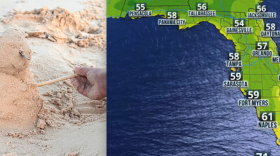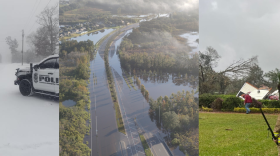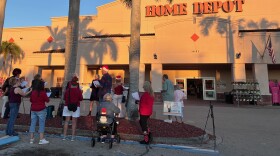It's been two years since FGCU's Vester Marine & Environmental Science Research Field Station has heard young voices engaged in learning about estuaries, beaches, mud, and animals at the facility's Marine Science Summer Camp.
Hurricane Ian's storm surge flowed through the Bonita Beach Road site's buildings, wrecking samples, and tossing tables, desks, chairs, equipment and appliances into a muddy, sodden mess. Ian's September 2022 passage stopped all activity at the former commercial fish house and old Florida-style resort.
"This is our first summer camp we've had in two years, it's for middle school students," Dr. Mike Parsons, professor of Marine Science at the Florida Gulf Coast University Water School and director of the Vester Station, said. "And basically, it's just getting these kids experience, hands-on experience in the water around the water."
Sitting by a small spit of land on Little Hickory Island near Barefoot Beach, the station has served as a resource for university students and faculty as well as researchers and scientists from around the world since 2007.
Parsons and others from FGCU guide incoming sixth to eighth graders through water quality testing, mangrove restoration efforts, and examining beach erosion over five days in classroom, laboratory, and field learning settings.
Parsons said the reaction of the students is telling.
"They really like it. They like being on the boat. They like being out in nature, they like being on the beach," he said. "And then, when we bring materials samples back into the lab, then they get to do the science and, and really see, you know, what it is to be a scientist and how we use the samples to really interpret what's going on."
Emotions, and feelings, aren't relegate to just the young students.
"It's great. I mean, it's a really good place to work," Parsons said. "It's nice to be on the water, kind of have the pulse on the system around here. And so it's really nice to be back in the environment here."
Tynisha Martin is a research assistant at the Vester Station and works specifically in Parson's lab. During the camp she was digging through mud cores to show students how that information translates.
"I study hurricanes. We look for them specifically in the geological record," she explained. "So what you guys are seeing is a core that we just took."
Martin told the students that the core they were seeing was good evidence of Hurricane Donna that hit the area in 1960 and explained how the layers were evidence of time and what materials were put down and when.
"So, maybe that is Donna. So we just took a core right there in those mangroves and then just straight across the channel there. So as you guys can see, we kind of see a changing of environment here," she said. "This just kind of shows us how everything has changed in this area through time."
More information
Parsons said the recovery from Ian at Vester has been a slow, long process, and the stations is still getting materials and equipment set back up.
"We're not 100% back up and running right now. But we hope to be in the next few months or so," he said.
He said the Marine Science Camp remains important, especially for this age of student.
"This is a real impressionable age on the kids," Parsons said. "This is where they, you know, their dreams are still within reach. And they still are very curious and want to explore and before they really start setting their sights on a more definitive path. So they're kind of open to everything at this age, and they're excited."
Parsons said just getting them out in the field, on the water and in the water, is a good experience for them to see what it's all about.
The students get to see all kinds of different animals — dolphins, manatees, all kinds of fish, oysters, crabs, and snails.
"They'll see a whole lot of everything, and maybe things they didn't even know existed and you know, whatever is living down in the mud and things like that, and some of them are pretty weird looking," Parsons said. "I'm sure that's a lot of fun for them."
The camp isn't just for the locals, either, he said.
"It's not only Florida kids, they'll be grandkids coming down to visit their grandparents. So we will get kids from up north and other places. They get to experience what we have here in beautiful Southwest Florida as well," Parsons said.
WGCU is your trusted source for news and information in Southwest Florida. We are a nonprofit public service, and your support is more critical than ever. Keep public media strong and donate now. Thank you.













